Thierry Petit
Exact Synthetic Populations for Scalable Societal and Market Modeling
Dec 08, 2025Abstract:We introduce a constraint-programming framework for generating synthetic populations that reproduce target statistics with high precision while enforcing full individual consistency. Unlike data-driven approaches that infer distributions from samples, our method directly encodes aggregated statistics and structural relations, enabling exact control of demographic profiles without requiring any microdata. We validate the approach on official demographic sources and study the impact of distributional deviations on downstream analyses. This work is conducted within the Pollitics project developed by Emotia, where synthetic populations can be queried through large language models to model societal behaviors, explore market and policy scenarios, and provide reproducible decision-grade insights without personal data.
A Constraint Programming Approach to Weighted Isomorphic Mapping of Fragment-based Shape Signatures
Jan 04, 2022
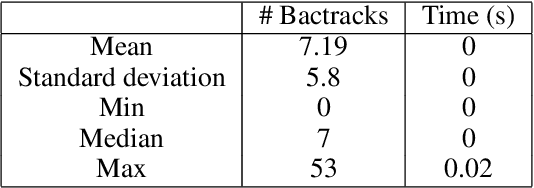
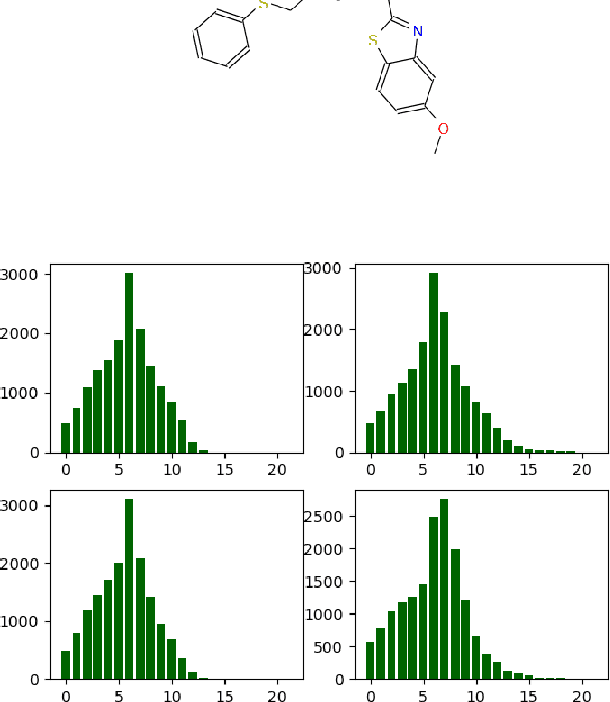
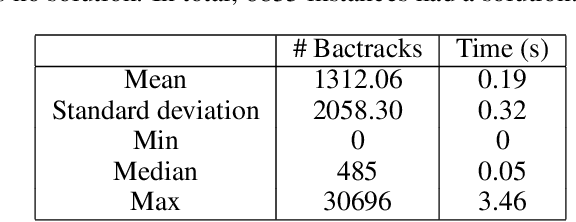
Abstract:Fragment-based shape signature techniques have proven to be powerful tools for computer-aided drug design. They allow scientists to search for target molecules with some similarity to a known active compound. They do not require reference to the full underlying chemical structure, which is essential to deal with chemical databases containing millions of compounds. However, finding the optimal match of a part of the fragmented compound can be time-consuming. In this paper, we use constraint programming to solve this specific problem. It involves finding a weighted assignment of fragments subject to connectivity constraints. Our experiments demonstrate the practical relevance of our approach and open new perspectives, including generating multiple, diverse solutions. Our approach constitutes an original use of a constraint solver in a real time setting, where propagation allows to avoid an enumeration of weighted paths. The model must remain robust to the addition of constraints making some instances not tractable. This particular context requires the use of unusual criteria for the choice of the model: lightweight, standard propagation algorithms, data structures without prohibitive constant cost. The objective is not to design new, complex algorithms to solve difficult instances.
"Model and Run" Constraint Networks with a MILP Engine
Nov 27, 2016


Abstract:Constraint Programming (CP) users need significant expertise in order to model their problems appropriately, notably to select propagators and search strategies. This puts the brakes on a broader uptake of CP. In this paper, we introduce MICE, a complete Java CP modeler that can use any Mixed Integer Linear Programming (MILP) solver as a solution technique. Our aim is to provide an alternative tool for democratizing the "CP-style" modeling thanks to its simplicity of use, with reasonable solving capabilities. Our contributions include new decompositions of (reified) constraints and constraints on numerical variables.
Dynamic Sweep Filtering Algorithm for FlexC
Aug 22, 2014

Abstract:We investigate cumulative scheduling in uncertain environments, using constraint programming. We detail in this paper the dynamic sweep filtering algorithm of the FlexC global constraint.
Three Generalizations of the FOCUS Constraint
Apr 22, 2013



Abstract:The FOCUS constraint expresses the notion that solutions are concentrated. In practice, this constraint suffers from the rigidity of its semantics. To tackle this issue, we propose three generalizations of the FOCUS constraint. We provide for each one a complete filtering algorithm as well as discussing decompositions.
A Generalized Arc-Consistency Algorithm for a Class of Counting Constraints: Revised Edition that Incorporates One Correction
Oct 21, 2011Abstract:This paper introduces the SEQ BIN meta-constraint with a polytime algorithm achieving general- ized arc-consistency according to some properties. SEQ BIN can be used for encoding counting con- straints such as CHANGE, SMOOTH or INCREAS- ING NVALUE. For some of these constraints and some of their variants GAC can be enforced with a time and space complexity linear in the sum of domain sizes, which improves or equals the best known results of the literature.
The Soft Cumulative Constraint
Jul 07, 2009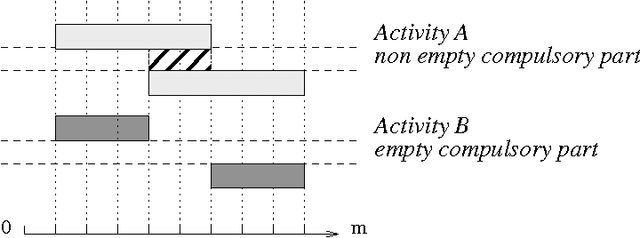
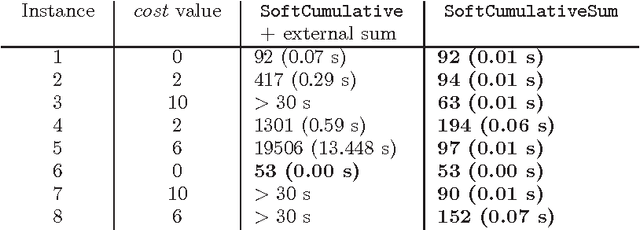

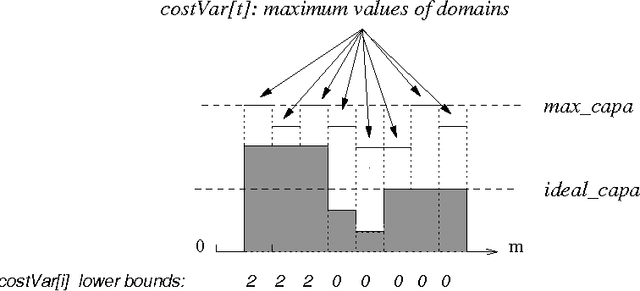
Abstract:This research report presents an extension of Cumulative of Choco constraint solver, which is useful to encode over-constrained cumulative problems. This new global constraint uses sweep and task interval violation-based algorithms.
 Add to Chrome
Add to Chrome Add to Firefox
Add to Firefox Add to Edge
Add to Edge